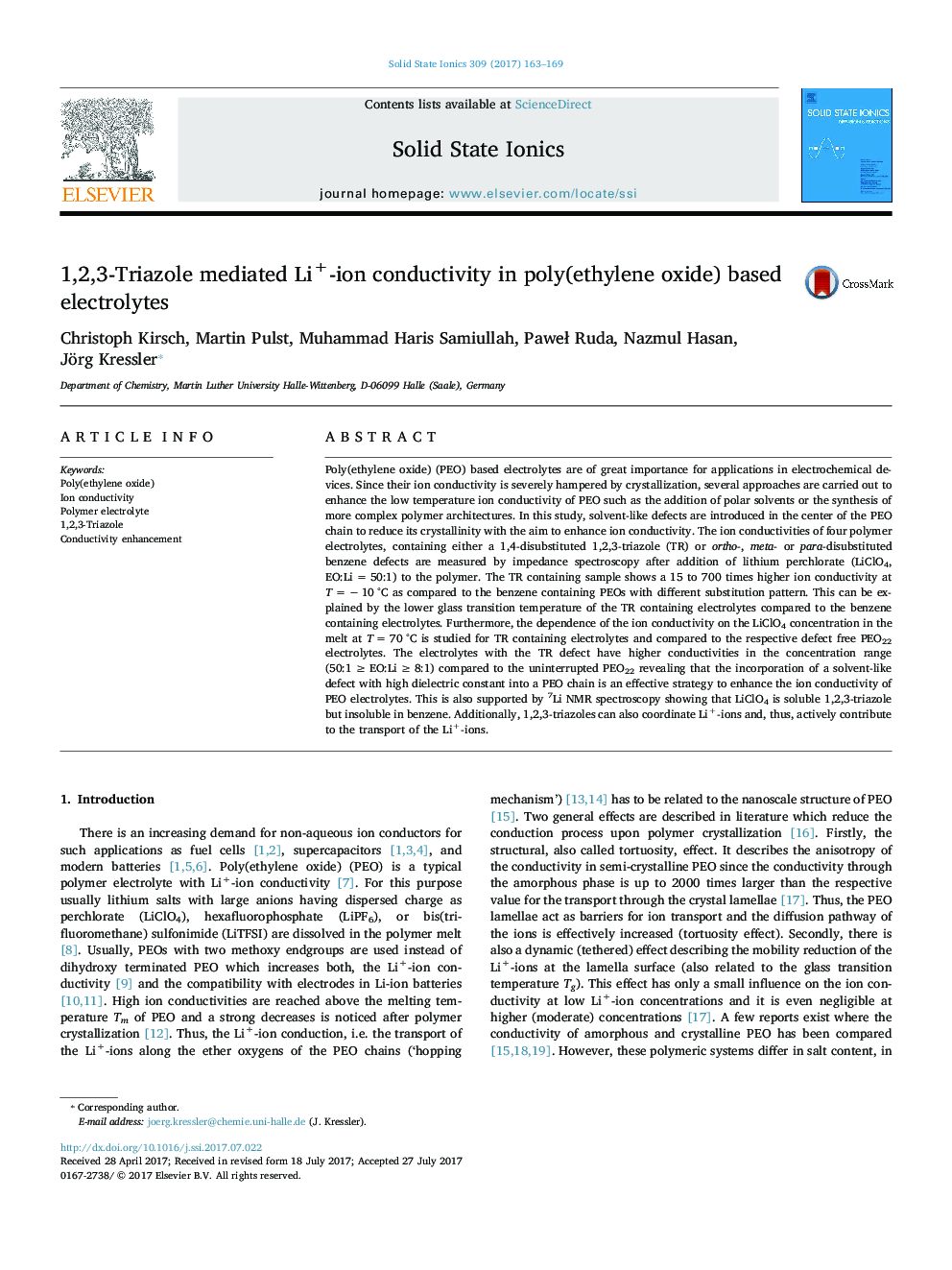| کد مقاله | کد نشریه | سال انتشار | مقاله انگلیسی | نسخه تمام متن |
|---|---|---|---|---|
| 5150345 | 1498234 | 2017 | 7 صفحه PDF | دانلود رایگان |
عنوان انگلیسی مقاله ISI
1,2,3-Triazole mediated Li+-ion conductivity in poly(ethylene oxide) based electrolytes
دانلود مقاله + سفارش ترجمه
دانلود مقاله ISI انگلیسی
رایگان برای ایرانیان
کلمات کلیدی
موضوعات مرتبط
مهندسی و علوم پایه
شیمی
الکتروشیمی
پیش نمایش صفحه اول مقاله

چکیده انگلیسی
Poly(ethylene oxide) (PEO) based electrolytes are of great importance for applications in electrochemical devices. Since their ion conductivity is severely hampered by crystallization, several approaches are carried out to enhance the low temperature ion conductivity of PEO such as the addition of polar solvents or the synthesis of more complex polymer architectures. In this study, solvent-like defects are introduced in the center of the PEO chain to reduce its crystallinity with the aim to enhance ion conductivity. The ion conductivities of four polymer electrolytes, containing either a 1,4-disubstituted 1,2,3-triazole (TR) or ortho-, meta- or para-disubstituted benzene defects are measured by impedance spectroscopy after addition of lithium perchlorate (LiClO4, EO:Li = 50:1) to the polymer. The TR containing sample shows a 15 to 700 times higher ion conductivity at T = â 10 °C as compared to the benzene containing PEOs with different substitution pattern. This can be explained by the lower glass transition temperature of the TR containing electrolytes compared to the benzene containing electrolytes. Furthermore, the dependence of the ion conductivity on the LiClO4 concentration in the melt at T = 70 °C is studied for TR containing electrolytes and compared to the respective defect free PEO22 electrolytes. The electrolytes with the TR defect have higher conductivities in the concentration range (50:1 â¥Â EO:Li â¥Â 8:1) compared to the uninterrupted PEO22 revealing that the incorporation of a solvent-like defect with high dielectric constant into a PEO chain is an effective strategy to enhance the ion conductivity of PEO electrolytes. This is also supported by 7Li NMR spectroscopy showing that LiClO4 is soluble 1,2,3-triazole but insoluble in benzene. Additionally, 1,2,3-triazoles can also coordinate Li+-ions and, thus, actively contribute to the transport of the Li+-ions.
ناشر
Database: Elsevier - ScienceDirect (ساینس دایرکت)
Journal: Solid State Ionics - Volume 309, 15 October 2017, Pages 163-169
Journal: Solid State Ionics - Volume 309, 15 October 2017, Pages 163-169
نویسندگان
Christoph Kirsch, Martin Pulst, Muhammad Haris Samiullah, PaweÅ Ruda, Nazmul Hasan, Jörg Kressler,